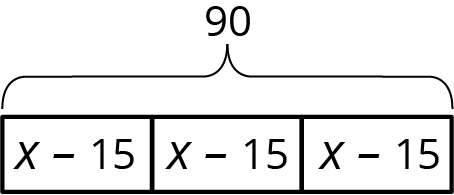Lesson 6
Distinguishing between Two Types of Situations
Problem 1
Match each equation to a story. (Two of the stories match the same equation.)
- \(3(x+5)=17\)
- \(3x+5=17\)
- \(5(x+3)=17\)
- \(5x+3=17\)
- Jada’s teacher fills a travel bag with 5 copies of a textbook. The weight of the bag and books is 17 pounds. The empty travel bag weighs 3 pounds. How much does each book weigh?
- A piece of scenery for the school play is in the shape of a 5-foot-long rectangle. The designer decides to increase the length. There will be 3 identical rectangles with a total length of 17 feet. By how much did the designer increase the length of each rectangle?
- Elena spends $17 and buys a $3 book and a bookmark for each of her 5 cousins. How much does each bookmark cost?
- Noah packs up bags at the food pantry to deliver to families. He packs 5 bags that weigh a total of 17 pounds. Each bag contains 3 pounds of groceries and a packet of papers with health-related information. How much does each packet of papers weigh?
- Andre has 3 times as many pencils as Noah and 5 pens. He has 17 pens and pencils all together. How many pencils does Noah have?
Solution
For access, consult one of our IM Certified Partners.
Problem 2
Elena walked 20 minutes more than Lin. Jada walked twice as long as Elena. Jada walked for 90 minutes. The equation \(2(x+20)=90\) describes this situation. Match each expression with the statement in the story with the expression it represents.
Solution
For access, consult one of our IM Certified Partners.
Problem 3
A school ordered 3 large boxes of board markers. After giving 15 markers to each of 3 teachers, there were 90 markers left. The diagram represents the situation. How many markers were originally in each box?

Solution
For access, consult one of our IM Certified Partners.
(From Unit 3, Lesson 2.)Problem 4
Select all the pairs of points so that the line between those points has slope \(\frac 2 3\).
\((0,0)\) and \((2,3)\)
\((0,0)\) and \((3,2)\)
\((1,5)\) and \((4,7)\)
\((\text-2,\text-2)\) and \((4,2)\)
\((20,30)\) and \((\text-20,\text-30)\)
Solution
For access, consult one of our IM Certified Partners.
(From Unit 2, Lesson 16.)